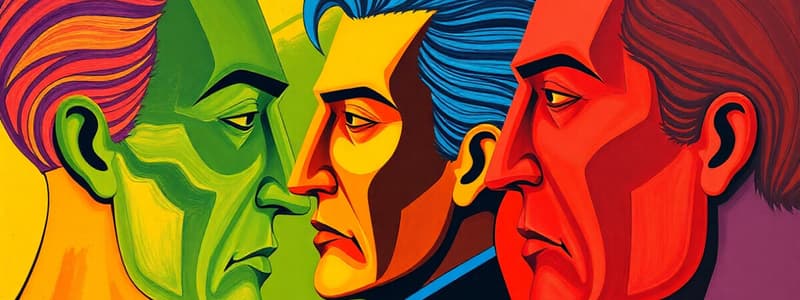Podcast
Questions and Answers
What is the primary function of the state in society?
What is the primary function of the state in society?
- To serve the needs of society (correct)
- To control individual freedoms
- To enforce religious beliefs
- To establish economic monopolies
Which type of authority is based on the legitimacy of tradition?
Which type of authority is based on the legitimacy of tradition?
- Charismatic authority
- Traditional authority (correct)
- Authoritarian authority
- Rational-legal authority
What is a characteristic of charismatic authority?
What is a characteristic of charismatic authority?
- It is inherited through family lines.
- It relies on leaders' personal qualities. (correct)
- It is stable and long-lasting.
- It commands respect based on laws.
In which system does the government control nearly all aspects of life?
In which system does the government control nearly all aspects of life?
What are the two models of power sharing discussed?
What are the two models of power sharing discussed?
What is the key difference between democratic and authoritarian systems?
What is the key difference between democratic and authoritarian systems?
According to Marxists, what does the government primarily serve?
According to Marxists, what does the government primarily serve?
What type of government is characterized by a strict adherence to religious laws?
What type of government is characterized by a strict adherence to religious laws?
What largely characterizes rational-legal authority?
What largely characterizes rational-legal authority?
Which option falls under the characterization of a military state?
Which option falls under the characterization of a military state?
Which of the following correctly differentiates the state from the government?
Which of the following correctly differentiates the state from the government?
What is meant by 'the state serves the interest of the dominant group'?
What is meant by 'the state serves the interest of the dominant group'?
What is a significant feature of apartheid in South Africa?
What is a significant feature of apartheid in South Africa?
Which aspect characterizes the current form of state mentioned?
Which aspect characterizes the current form of state mentioned?
What role do social struggles play in the context of state and governance?
What role do social struggles play in the context of state and governance?
During which period was South Africa under pre-apartheid segregation?
During which period was South Africa under pre-apartheid segregation?
Flashcards are hidden until you start studying
Study Notes
Power and Politics
- Power is the ability of individuals or groups to make their interests count, even when others resist.
- Power can involve the use of force and is accompanied by ideas that justify actions.
- Power exists in all social institutions and is used by the powerful to ensure their interests.
Types of Authority
- Traditional authority: based on the legitimacy of its existence, inherited power, examples are monarchs (kings, queens). People accept traditional authority because they are invested in the past and feel obligated to perpetuate it.
- Charismatic authority: people accept the power of a certain person because they are drawn to the leader's personal qualities. This type of power emerges in crisis and offers innovative or radical solutions. These leaders tend to hold power for a short duration.
- Rational-legal authority: power is made legitimate by laws, written rules, regulations, etc. Power is invested in a particular rational system/ideology and not in a person, for example, the Constitution.
State vs. Government
- State: all-encompassing, consists of legislature, executive, and judiciary.
- Legislature: parliamentary systems, political parties
- Parliament: elected body
- Executive: government ministries, departments, and apparatuses that implement legislation
- Judiciary: legal and court systems
- Government: refers to the sphere of legislature, the political party with the most members in the parliament forms the government. The government changes, but the state continues to function.
Domination and Struggle
- Different forms of states exist including:
- Capitalism
- Military states
- Authoritarian states
- Liberal democratic states
- The state serves the interests of the dominant group.
- Due to the division of society into dominated and dominant groups, social struggles take place.
- Ongoing struggles make politics more than just voting in elections.
- Nation-states are linked to national groups including citizens, who have their own specific history and territory.
- Each nation-state is linked to each other in a global system.
Segregation, Apartheid, and Post-Apartheid South Africa
- South Africa was established in 1910.
- From 1910 to 1948, there was a pre-apartheid segregation period.
- The early 1990s are seen as transitional years for post-apartheid South Africa.
Studying That Suits You
Use AI to generate personalized quizzes and flashcards to suit your learning preferences.




